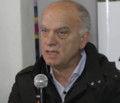2023 Buenos Aires provincial election|
|
| Turnout | 10,439,895 (75.51%)
 4.49 pp 4.49 pp |
|---|
|
|
 Map showing the seats won by each party in each partido Kicillof (88) Grindetti (43) Píparo (3) |
|
General elections were held in Buenos Aires Province on 22 October 2023, alongside national elections. The governor and vice governor, as well as half of the Chamber of Deputies and a half of the Senate were renewed. In addition, the municipal offices in the 135 partidos were renewed as well.[1]
The candidacies of each major coalition were defined in the open, simultaneous, and mandatory primaries (PASO), which took place on 13 August 2023. Lists that won at least 1.5% of the votes (including blanks) qualified to the general election.[2]
Incumbent governor Axel Kicillof, of Union for the Homeland (UP), was re-elected to a second term with 44.88% of the vote. Analysts pointed to Kicillof's successful re-election bid as a major factor in bolstering the shock victory of UP presidential hopeful Sergio Massa in the first round of the country's presidential elections.[3][4]




